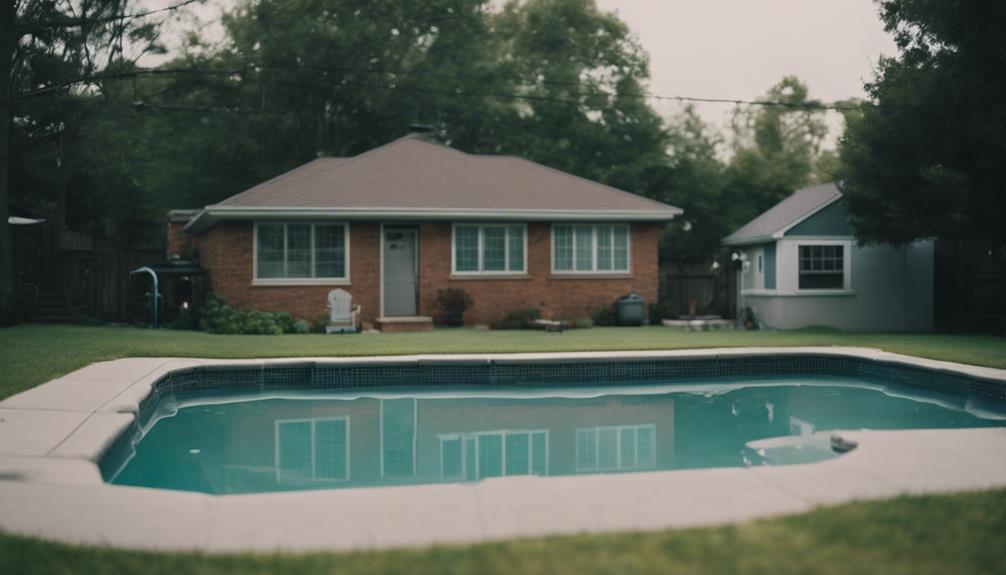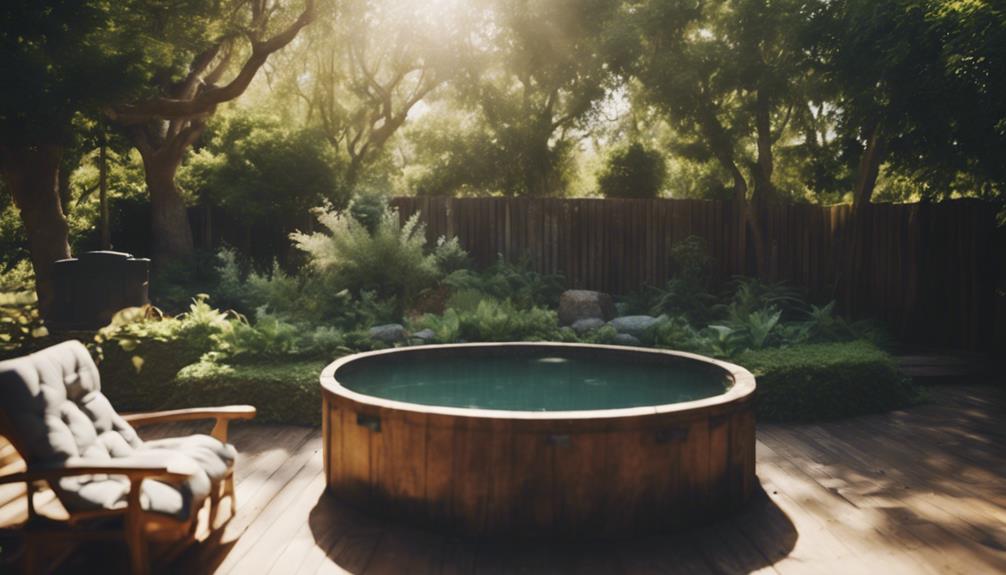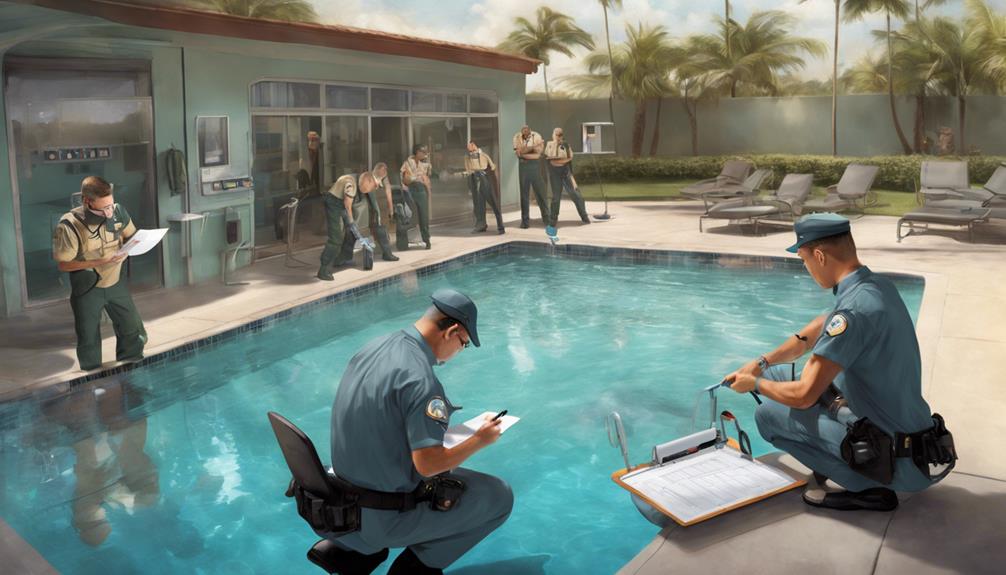Considering adding a pool near a septic tank? Ensure you stay at least 25 feet away to avoid any issues! Obtain approval from local health authorities and avoid septic tank lines! Dispose of pool water far from the septic system, and keep chlorine away from the tank! Keep an eye out for leaks and pool spills; you don’t want a wet septic situation. Make sure professionals approve the plan and abide by the regulations to maintain the functionality of your water systems. Remember, a cautious installation results in a worry-free swim!
Key Takeaways
- Check local setback regulations for pool-septic distance.
- Avoid draining pool water into septic system to prevent damage.
- Consult septic professionals before pool installation near septic tank.
- Proper maintenance of both pool and septic system is crucial.
- Obtain necessary permits and follow zoning regulations for pool installation.
Location Considerations
Before proceeding with the installation of a swimming pool in your property, it's important to carefully consider the location in relation to the existing septic tank and field.
When it comes to Inground pools and Septic systems, the minimum distance between them is vital. Make sure your pool is at least 25 feet away from the septic lines and tank to prevent any potential issues.
To determine the best spot, reach out to your local septic service for assistance. They can provide a property survey to guarantee you meet the necessary requirements.
Also, remember to check your local regulations with the health department. These regulations often dictate the setback requirements for pools near septic systems.
Additionally, if you have a well head on your property, factor this into your decision-making process as well.
Drainage and Pool Water Disposal
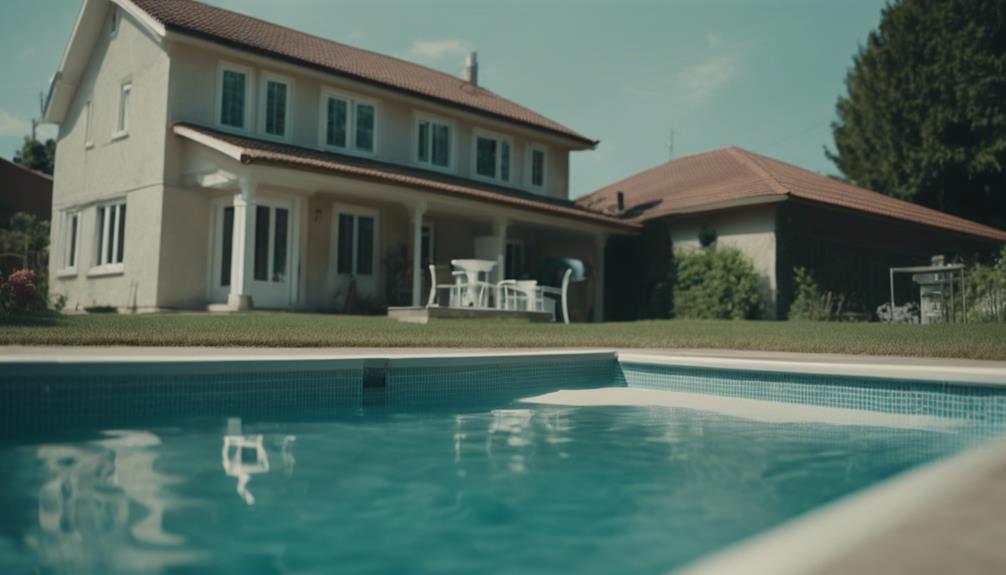
Considering the potential impact on your septic system, proper drainage and disposal of pool water are crucial aspects to keep in mind when maintaining your swimming pool.
Here are some key points to remember:
- Drainage: Make sure to direct pool water away from your septic system to avoid any damage.
- Chlorine-treated water: Never drain chlorine-treated pool water into your septic tank as it can harm the essential bacteria needed for waste breakdown.
- Backwashing filters: Be cautious with backwashing filters and promptly address any leaks to prevent harm to your septic system.
- Pool overflow: Avoid pool overflow to protect your septic system from potential damage or saturation.
Impact of Chlorine on Septic Systems

To properly maintain a swimming pool with a septic system, it's essential to understand how chlorine can impact the health of your septic tank.
The chlorine used to keep your pool water clean and safe can actually be a bit of a troublemaker for the beneficial bacteria in your septic system. These bacteria play an important role in breaking down waste and keeping your septic tank functioning properly.
When too much chlorine enters the septic system, it can disturb the delicate balance of these helpful microbes, potentially causing issues with how well your septic tank operates.
Maintenance Tips for Pool and Septic System

Proper maintenance of both your pool and septic system is crucial for guaranteeing their efficient operation and longevity. To keep things running smoothly, here are some maintenance tips for your pool and septic system:
- Regular Pumping: Make sure your septic tank is pumped out by professionals as recommended for peak performance.
- Water Conservation: Be mindful of excessive water use to prevent overwhelming your septic system, which could impact your pool too.
- Careful Chemical Usage: Use pool chemicals sparingly and follow guidelines to prevent harmful substances from affecting your septic system and leach field.
- Local Expert Consultation: When in doubt, seek advice from local professionals who understand the specific needs of both your pool and septic system.
Professional Consultation and Inspections
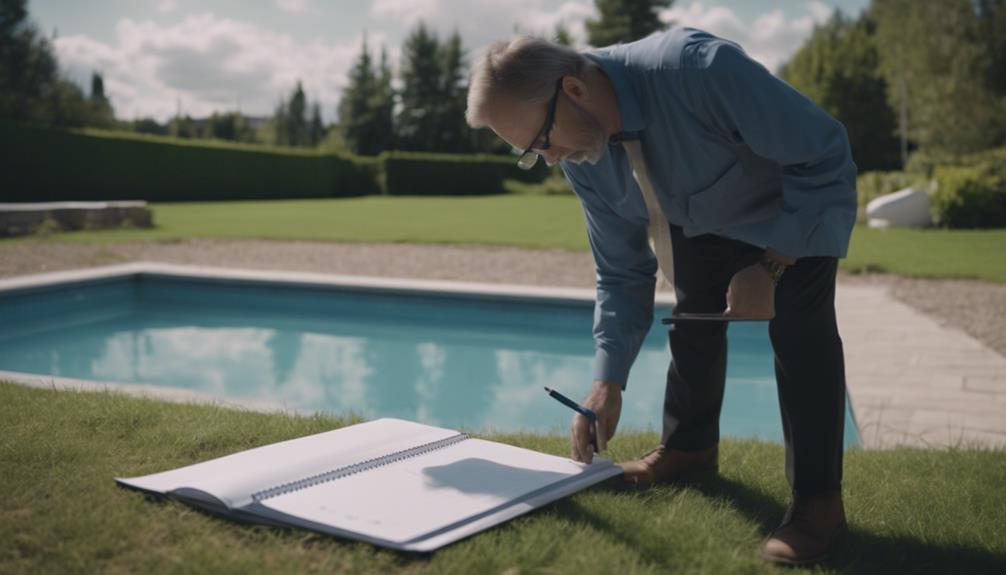
Before you start digging that pool, chatting with a septic pro is a smart move. They'll suss out how your pool plans might shake up your septic setup and suggest safety measures.
Getting the lowdown from these experts guarantees that your pool and septic system live happily ever after on your property.
Expert Septic Assessment
Consider consulting a septic professional for an essential evaluation to guarantee your swimming pool can coexist safely with your septic system. Expert assessments can provide vital insights into whether your pool and septic system can peacefully share the same property.
Here are some key points to remember when seeking expert septic assessment:
- The field where your pool is located should be at a safe distance from your septic components to prevent any interference.
- Professional inspections can help determine if the ground swimming pool installation might affect your septic tank or drainage system.
- Guidance from septic experts can assist in identifying the best placement for your pool to avoid any potential issues with your septic system.
- Assessments not only highlight risks but also offer essential precautions for installing a pool near a septic tank.
Potential Pool Impact
Before proceeding with your swimming pool installation, it's crucial to seek professional consultation and inspections to understand the potential impact on your septic system. By consulting with experts, you can guarantee that your pool does not disrupt the functionality of your existing septic tank and septic field. Here's a handy table to show the key considerations when installing an inground pool near a septic system:
| Aspect | Importance | Action Needed |
|---|---|---|
| Septic Tank | Crucial to system operation | Identify tank location and capacity |
| Septic Field | Critical for proper drainage | Avoid placing pool near field |
| Local Regulations | Ensure compliance for pool and septic system | Check rules for pool and septic |
| Professional Help | Essential for proper planning and placement | Consult septic expert for guidance |
Safety Measures Required
Seeking professional consultation and inspections is vital when considering the safety measures required for installing a swimming pool near a septic tank. As responsible pool owners, it's important to consult with a professional septic system inspector before taking the plunge.
Here are some key points to keep in mind:
- Consult with a professional: Get expert advice to understand the potential risks and safety measures needed.
- Local regulations: Make sure you comply with all local regulations and setback requirements to avoid any legal issues.
- Septic system inspector: Have a professional inspector assess your septic system to identify any potential interferences with the pool installation.
- Proper pool placement: Guidance on the correct placement of your pool can help prevent any disruptions to your septic system.
Permits and Regulations for Pool Installation

So, when you're getting ready to put in that awesome swimming pool, don't forget about permits and regulations! These rules are super important because they make sure your pool doesn't mess with your septic tank.
You'll need to follow setback requirements, which usually mean keeping your pool at least 25 feet away from your septic system.
Permit Requirements
To install a swimming pool near a septic tank, you must obtain permits that adhere to specific setback requirements from the septic system. When it comes to getting your pool set up properly, there are some key things you need to keep in mind. Here's a quick list to guide you through the permit requirements:
- Setback Distances: Make sure your pool is at least 25 feet away from the septic system to meet regulations.
- Local Building Codes: It's important to follow the rules set by your local area to secure a permit for your pool installation near a septic tank.
- Compliance Matters: Failing to comply with permit requirements can lead to delays or even denial of your pool installation plans, so make sure to tick all the boxes.
- Understanding Setback Distances: Knowing and sticking to the setback distances is key for a successful swimming pool installation in relation to your septic tank.
Zoning Regulations
Guarantee compliance with zoning regulations by securing the necessary permits for installing a pool near a septic tank. Zoning regulations are like the rules of the pool party – you need to follow them to keep everything running smoothly.
These regulations often include setback distances, which are the important distances required between your pool and the septic tank. It's essential to check these distances to make certain your pool doesn't interfere with the septic tank's leach field.
When it comes to permits, think of them as your golden ticket to pool paradise. Without the proper permits, you might find yourself in hot water – and not the kind you enjoy swimming in! Remember, different rules may apply for in-ground pools versus above-ground ones, so be sure to double-check what's needed for your specific setup.
If you're feeling a bit lost in the sea of regulations, don't worry! Local health departments or authorities are there to help navigate the waters of zoning regulations for pool installations near septic tanks.
Frequently Asked Questions
How Close to Septic Can You Put a Pool?
You can put a pool close to a septic tank, but it's important to keep your distance for safety! In-ground pools should stay at least 25 feet away to avoid any mishaps with your septic system.
For above-ground pools, aim for a 15-foot buffer zone to play it safe. Adhering to these guidelines will help you enjoy your pool without causing any damage to your septic setup.
Always check local rules for exact requirements!
Is Chlorine OK for Septic Tanks?
Sure, chlorine is a no-go for septic tanks!
Did you know that using chlorine in your pool can mess with the good bacteria that keep your septic system running smoothly?
Dumping chlorine-filled pool water into your septic tank can throw off its balance and cause issues.
To keep things flowing right, avoid draining pool water with chlorine into your septic system.
Your septic tank will thank you for it!
Does a Pool Drain Into a Septic Tank?
When it comes to having a swimming pool with a septic tank, it's important to avoid draining pool water into the septic system. Pool chemicals like chlorine can interfere with the bacteria in the tank, disrupting the waste breakdown process.
To prevent overloading the septic system or causing water saturation, it's best to manage pool water separately. Proper water management is key to keeping both your pool and septic tank in tip-top shape!
What Not to Use if You Have a Septic Tank?
When dealing with a septic tank, it's best to steer clear of antibacterial soaps and harsh chemicals that upset the bacteria balance.
Also, avoid flushing non-biodegradable items like wipes and feminine products that can clog things up.
Be cautious with oil-based products such as certain lotions and makeup that can form a barrier in the tank.
Remember not to dump medications or chemicals down the drain, and try to limit strong disinfectants like bleach that can harm the septic system's helpful microbes.
Is It Safe to Store Pool Chemicals Near a Septic Tank?
When considering chemical storage safety guidelines, it is not recommended to store pool chemicals near a septic tank. The fumes from the chemicals can potentially be harmful to the septic system and compromise its function. It is best to store pool chemicals in a separate, well-ventilated area away from the septic tank.
Is Green Water in a Pool Harmful for a Septic Tank?
Green water in a pool can signal safety concerns with green water algae, which can harm a septic tank. Algae growth can clog filters and pipes, leading to costly repairs. Regular pool maintenance and proper chemical balance can prevent green water and protect both the pool and septic system.
Will Having a Fitness Pool Affect My Septic Tank System?
If you’re considering a revamp your backyard fitness pool, it’s important to consider its impact on your septic tank system. While regular use of the pool may increase water usage, proper maintenance and regular pumping of the septic tank should mitigate any potential issues. Be sure to consult a professional for specific recommendations.
Conclusion
So, there you have it! Having a swimming pool with a septic tank is totally doable, but it does require some extra care and attention.
Just remember to take into account the location, manage drainage properly, watch out for chlorine, and stay on top of maintenance.
And hey, if all else fails, you can always call in the professionals for help.
So go ahead, immerse yourself and enjoy your pool without worrying about your septic system!

